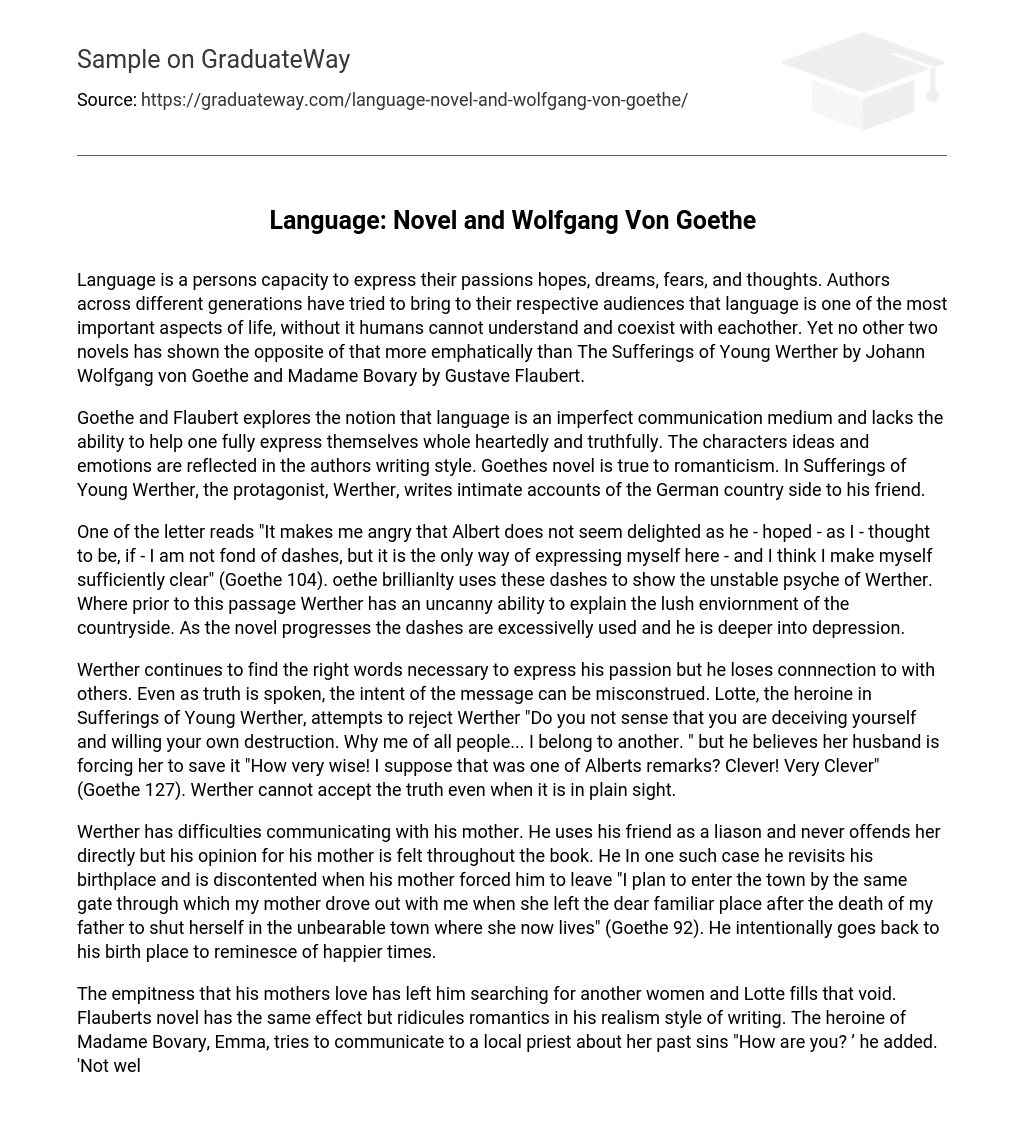Language is the ability of individuals to convey their emotions, aspirations, desires, anxieties, and ideas. Authors spanning various eras have endeavored to convey to their targeted readers that language holds immense significance in life; without it, human beings cannot comprehend and peacefully coexist with one another. Nonetheless, no two novels exemplify the contrary perspective more profoundly than Johann Wolfgang von Goethe’s “The Sufferings of Young Werther” and Gustave Flaubert’s “Madame Bovary.”
Goethe and Flaubert both explore the concept that language is an imperfect means of communication, incapable of allowing individuals to fully and genuinely express themselves. The authors’ writing styles reflect the ideas and emotions of their characters. Goethe’s novel adheres faithfully to the romanticism movement. In “Sufferings of Young Werther,” the main character, Werther, writes personal and detailed descriptions of the German countryside in his letters to a friend.
Goethe brilliantly uses dashes to show the unstable psyche of Werther, as one of the letters reads “It makes me angry that Albert does not seem delighted as he hoped—as I thought he would be—if I am not fond of dashes, but it is the only way of expressing myself here—and I think I make myself sufficiently clear” (Goethe 104). Prior to this passage, Werther had an uncanny ability to explain the lush environment of the countryside. However, as the novel progresses, the excessive use of dashes indicates his deepening depression.
Werther struggles to articulate his intense emotions, resulting in a disconnection from others. The meaning behind spoken words can be misinterpreted, as demonstrated when Lotte rejects Werther’s advances by telling him that she belongs to someone else: “Do you not sense that you are deceiving yourself and willing your own destruction. Why me of all people… I belong to another.” However, Werther remains convinced that Lotte’s husband is pressuring her to reject him: “How very wise! I suppose that was one of Alberts remarks? Clever! Very Clever” (Goethe 127). Even when faced with undeniable truth, Werther refuses to accept it.
Werther struggles with communication with his mother. Rather than directly offending her, he utilizes his friend as an intermediary. However, his discontent towards his mother is evident throughout the book. One particular instance occurs when he revisits his birthplace. He is unhappy when his mother compelled him to leave, stating, “I plan to enter the town by the same gate through which my mother drove out with me when she left the dear familiar place after the death of my father to shut herself in the unbearable town where she now lives” (Goethe 92). He intentionally returns to his birthplace to reminisce about happier times.
The emptiness caused by his mother’s lack of love leads him to search for another woman, and Lotte fills that void. Flaubert’s novel also has a similar effect but mocks romantics through his realistic writing style. The protagonist of Madame Bovary, Emma, attempts to confess her past sins to a local priest. She says, “How are you?” he replied, “Not well,” Emma said. The priest answered, “Well, and so am I. These first warm days weaken one remarkably, don’t they?… ‘Ah,’ said Emma, ‘it is not an earthly remedy I need… you provide solace for all sorrows’… ‘Well, you see, you were putting your hand to your forehead. I thought you felt faint. Then, remembering himself, ‘But you were asking me something? What was it? I really don’t remember.’ ‘Nothing! Nothing!’ repeated Emma” (Flaubert 93-94).
Emma went to the priest to confess her adultery, but he misunderstood and thought she was physically ill. Her husband Charles, who is a doctor, could help with her physical pain, but Emma was seeking a spiritual solution. This miscommunication is seen again in the final chapter when Charles finds a letter from Rodolphe. Charles misinterprets the letter, believing that Rodolphe is a good person and Emma is innocent. Words can be deceptive, as seen in a letter from Rodolphe to Emma where he regrets dragging her into an abyss and wishes he never knew her.
Flaubert (163) depicts Rudolphe’s self-punishment through exile as a result of the wrongdoing he has committed towards Emma. The purpose of the letter is to terminate their affair, as Emma has lost interest and become disengaged with Rudolphe. Rudolphe manipulates language to serve his own selfish motives, never intending to elope with Emma. Emma mirrors this behavior when confronted by Charles in the middle of the night in a different town. When questioned about her whereabouts, she dismissively responds, “Oh, it isn’t worth while,” indicating her lack of concern. Emma clarifies that she had been at Mademoiselle Lempereur’s but advises Charles not to worry about it in the future, as she went out just now.
Flaubert states, “I do not feel free, you see, if I know that the least delay upsets you like this” (218). Emma’s perpetual lying serves the purpose of escaping consequences and gaining trust from Charles. The novels of Goethe and Flaubert reveal the limitations of language. Auerbach agrees with Flaubert, emphasizing that actions convey more meaning than words: “Insight into the being, the motives and the development of the characters thus arises out of the sheer representation of the contents of everyday actions” (434). Werther’s and Emma’s lives were ruined due to language’s inadequacies. The foundation for a healthy relationship with others is impossible to establish if communication mediums are distorted and misunderstood.
Works Cited
The text includes the following citations and references:
– Auerbach, Erich. “On the Serious Imitation of the Everyday. ” Madame Bovary. Ed. Margaret Cohen. New York: W. W. Norton & Company, Inc., 2005. 432.
– Flaubert, Gustave. Madame Bovary. Ed. Margaret Cohen. 2nd ed. Trans. Eleanor Marx Aveling and Paul de Man. New York: W. W. Norton & Company, Inc., 2005.
– Goethe, Johann Wolgang von. The Suffferings of Young Werther. Trans. Stanley Corngold. New York: W. W. Norton & Company, Inc., 2012.





